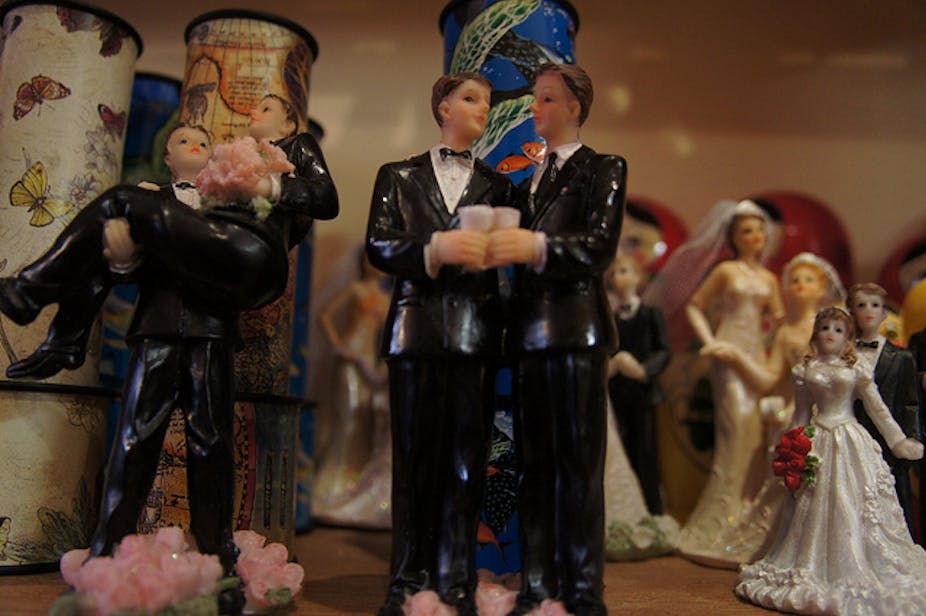Earlier this year, Byron Bay mayor Simon Richardson announced that he wants his council to pass a motion recognising same-sex marriage and to set up a “love park”.
That the theme of the park is love rather than marriage, equality, rights or justice is of significance. Opponents of same-sex marriage continually argue that marriage should remain an institution between a man and a woman because it is geared toward procreation. This often extends to another equally fallacious argument that a heterosexual family is the best place for children to be born and raised.
Supporters of same-sex marriage reject that marriage is about procreation, arguing instead that it is about love and should therefore not exclude same-sex relationships. The connection between love and marriage is a long argued one in academic texts and it is also evident in empirical studies.
Studies conducted by Relationships Australia consistently report that love is either the top reason - or one of the top reasons - people give for marrying. In 2008, a staggering 91% of respondents said they married for love. No matter what socially conservative politicians and the religious right say, the central motif of marriage in Western countries in the 21st century is romantic love.
The debate should now move from asking what the recognition of same-sex marriage does for the meaning of marriage to another interesting question. What does the recognition of same-sex marriage do for the meaning of romantic love?
Love: a controversial concept
The first step in answering this question requires an acknowledgement that romantic love is a controversial idea. From the very beginning it was considered dangerous. It was a radical power capable of breaking down the most entrenched social, cultural and religious barriers.
Love also has connections with liberty and freedom; a disconnection from family, class, social and religious duty; and an association - no matter how misconceived - with sexual freedom. All told, this made love a threat to traditional family structures and to life-long monogamous marriage.
Many point to the casualties of romantic love. These casualties are said to be high divorce rates, loneliness, poverty and social instability.
Love as the oppressor
Feminists have long argued that romantic love is “a pivot of oppression” and “a curse” for women because it hooks them into dependent relationships with men and easily turns them into wives and mothers.
But it is more than this. For many feminists the ideology of love itself is oppressive. In her latest book Why Love Hurts, sociologist Eva Illouz argued that love - as exercised through the control of choice, freedom, autonomy and commitment - are controlled by men and generally disadvantage women.
Another significant critique comes from queer theorists, who claim that love, rather than being the radical force capable of breaking down barriers, is in fact heteronormative: it is constructed around scripts of nature, family, domesticity and heterosexuality.
Despite these critiques, love remains a dominant goal in modern society. Its connection with individual freedom makes it a difficult idea to reject. Love is part of who we are, and we cannot return to a time before it.
As author Wendy Langford argued in her book Revolutions of the Heart, it is neither possible nor desirable to return to a time when personal relationships were not seen within the paradigm of romantic love. She argues that:
No remedy is to be found in a reactive return to the regulation of love along traditional lines. Justice and humanity cannot thrive through the imposition of a repressive moral order and the institutionalisation of oppressive practices.
Further, Illouz notes that we must not forget that the dominance of love has directly correlated with a decline in men’s power over women and with an increase in equality between the sexes.
The many legal changes that have occurred to the laws of marriage, for example, have coincided with the period of history where intimate relationships have been influenced by the liberalising egalitarian and radical ideology of love.
Love’s radical, liberating potential
Given the complexities associated with our understanding of romantic love, it is difficult to tease out the implications of its association with marriage.

If we take the radical reading of love, then its association with marriage can be a sign of the institution of marriage also becoming radicalised. It is more able to deliver satisfaction to each of its parties and more open to individual negotiation, but less embedded in rules and expectations, less tied to gender stereotypes, less focused on biological and natural readings, less heterosexual, less “family” and less monogamous.
If we take the oppressive reading of love, however, then the connection of love and marriage does very little to change the traditional meanings of marriage.
It is also interesting to ask the same question in reverse: what does marriage do for love? Again, the question depends on the interpretation of marriage. Staying with the traditional meanings, if we connect marriage to love it diminishes love’s radical potential.
This is the very concern that has been shown by feminists and queer scholars who have opposed same-sex marriage. As an institution, marriage is too conservative: its past is too dark and too oppressive for those who have a radical outlook and aspirations in their own love lives to subscribe to it. What this suggests is that the radical potential of love will be lost when it is aligned to marriage.
But what if we see marriage in the modern guise many want it to assume: that it is a relationship between free equals formed for the attainment of personal satisfaction, and open to all individuals regardless of gender and sexuality. In this model, marriage and love simply reinforce each other’s radical potential.

